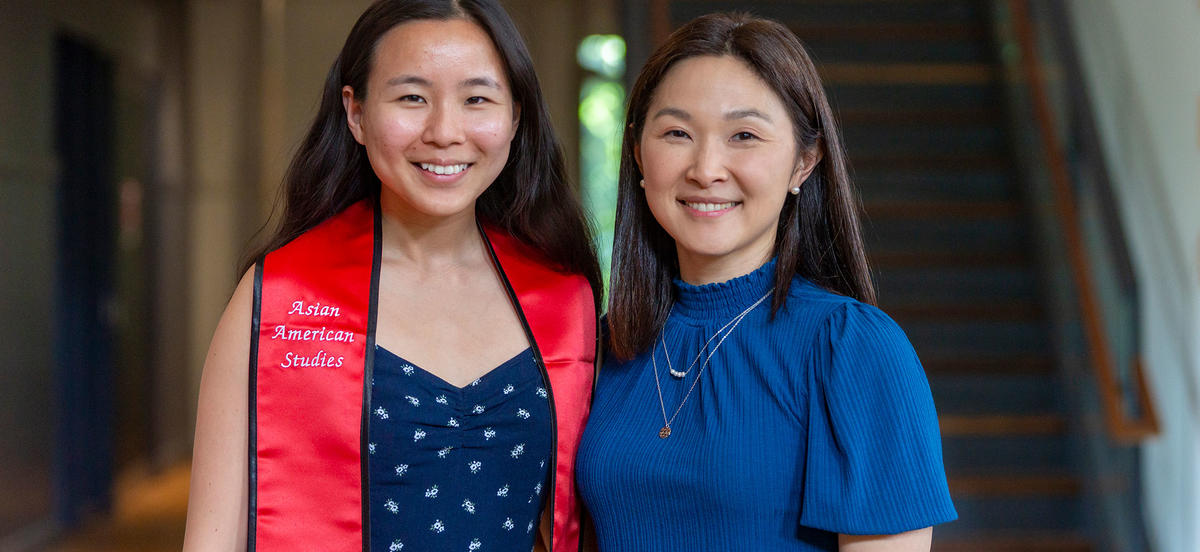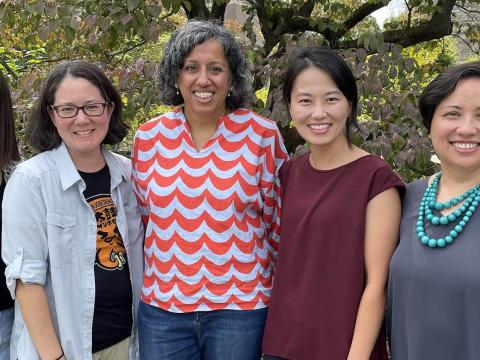Asian American Studies Minor Marks a Successful Inaugural Year

Details
A combined effort of the Tri-College Consortium of Haverford, Swarthmore, and Bryn Mawr, the new minor is an interdisciplinary curriculum designed to help students develop an understanding of Asian American experiences, histories, cultures, and art.
With a course load already supporting majors in psychology and anthropology, Cathy Zhu ’23 appeared to be maxed out when Haverford’s long-anticipated, six-years-in-the-making Asian American Studies program launched in earnest in the autumn of 2022. But an encouraging email from her eternally encouraging advisor, Professor Shu-wen Wang, convinced her that she could add that minor to her already impressive resume.
“She looked at my course transcript and saw that I had actually fulfilled most of the requirements besides one or two,” says Zhu. “And so she asked me if I wanted to consider it, and I said definitely, 100 percent without a doubt.” Zhu, who was able to complete those final course requirements during her senior year, was honored as the top student in both of her majors during commencement this spring.
Zhu and the other 14 students (seven at Haverford, four at Swarthmore, four at Bryn Mawr) who have declared minors in the Asian American Studies program recently celebrated the program’s first graduating class in a ceremony at Haverford. The minor draws students from a variety of disciplines such as chemistry and neuroscience, alongside the humanities and social sciences. Courses such as “Asian American Psychology” and “Asian American Literature” center around and contextualize Asian American experiences within the broader field of critical race and ethnic studies.
Assistant Professor of English Elizabeth Kim taught two Asian American literature courses this past year and was delightfully surprised by the students’ enthusiasm for her courses from day one. “When I asked everyone to share briefly about why they were interested in taking the course, so many of them expressed with sincerity that they had waited years for such a course to exist,’’ says Kim, whose classes were mostly made up of juniors and seniors. “I could immediately sense the students’ genuine desire to study this material because it had been virtually absent from much of their educational experience.’’
Unique in its construction, the curriculum, says Wang, aims to “offer interdisciplinary opportunities for all of our students to more fully engage with critical issues of race and ethnicity in America as part of a liberal arts education that prioritizes diversity and inclusion.”
An Associate Professor of Psychology, Wang is one of the program co-directors. Swarthmore College Associate Professor of Music Lei Ouyang is the other co-director. Wang and Ouyang work with a committee consisting of faculty across the Tri-Co who teach courses in Asian American Studies; at Haverford, this includes Kim along with Associate Professor of Gender and Sexuality Studies Gina Velasco and Assistant Professor of History and East Asian Languages and Cultures Ruodi Duan. The Haverford administration has been supportive of the program, with Associate Dean of the College Theresa Tensuan also teaching a course.
Those seeking the minor are required to take six courses across three fields. Two of the fields —Asian American histories, culture, and experiences; and global and transnational connections with Asia—speak directly to the experiences and issues faced by Asian immigrants and their descendants. But the third area, in comparative race and ethnic studies, highlights the need to situate this history alongside and in solidarity with the experiences of the Latinx and Black communities, Wang says.
Thus far, the courses have explored historic patterns of Asian American exclusion and alienation and their impact on American culture. For example, the appreciation of foods, customs, and arts of the varying Asian American cultures has not correlated with a mainstream acceptance or integration of those cultures.
“Consider those Asian Americans who have lived within the U.S. for hundreds of years and yet are still painted by some as not from here,” says Wang. “They haven't really been seen as part of American history or part of the American story,’’ she says.
“There’s been this kind of appreciation for different Asian cultures as long as it benefits the U.S., but it’s never been accepted as mainstream. We're in this moment now, generations in the making and due to social movements and protests, where there is just more of a recognition that Asian Americans are part of America. In the place and time that we’re in now, there’s more visibility and an ability to really claim space in American culture for people who are of Asian descent. That’s why Asian American Studies is so important. It’s both the invisible and hyper-visible narrative of being Asian and Asian American.’’
Adds Kim, “It’s become somewhat banal to say that a racial identity is not monolithic, but I saw my students discuss this with astute specificity through close readings of the ways in which ethnicity, gender, and class dynamics factor into the inescapable hybridity of Asian American identity.’’
For recent grad Zhu, the Asian American Psychology course taught by Wang went beyond the classroom and into her own home. “I definitely wanted to learn more about Asian American Studies, learning about my own people, but that class definitely cemented it for me,’’ she says. “That class taught me a lot about myself and my family, about some of the factors [in] why my family and I may have differences and clash occasionally.’’
In fact, there is so much enthusiasm for the courses offered that many have been overenrolled. The co-directors would like to invite more faculty to join the program and expand the range of courses offered.
“I see the minor expanding in terms of the variety and diversity of course offerings,” Kim says. “For example, I would love to eventually teach a course on film and TV adaptations of works by Asian American writers. Many of the Tri-Co faculty members in the Asian American Studies program also do interdisciplinary work, so I’m excited to see the development of new, unique courses that delve into the multiple facets of Asian American experience.’’
“We're really just looking to grow,” says Wang. “We want to be able to offer more courses. We want to be able to include more faculty who are offering these courses for the long-term.
“I think having a program where there is a cohesive home for this kind of work, and where students can connect with faculty and have longer term relationships gives the program more longevity and gives it the roots to grow further.”
—Sam Donnellon

















